Talk:The Crimbo 11 Table
No Card Counting
- Can Someone confirm that the dealer stays on a soft 9?
(We know he stays on Hard 9 or soft 10 and hits hard or soft 8s)
- Confirmed, I just had him get an Ace and 3 and he stayed. Morgoth1145 21:58, 15 December 2009 (UTC)
I was wondering if it was possible to use card counting systems for advantage here. I'm willing to conclude that it is not. I played 20 consecutive games keeping records of the cards seen. In those 20 games, there were never duplicate cards in the same game, which would be unlikely if we were playing with multiple decks. Yet there were several instances of the same card appearing in 3 consecutive games.
I am fairly certain this game is played with a single 24 card deck, which is shuffled after each hand.
Data follows:
| Consecutive Games |
|---|
| Ad, Ks : 2h, 4d, 3c |
| ??, Ac : 2d, Ad, Ks, Kd |
| Ac, Kc : 5c, 2c, 4c |
| ??, As : Ad, Kc |
| 4c, 5h : Ac, 3c, 2h |
| Ad, 4d : Ac, 3s, 2s |
| ??, 3d : 4s, 4d, 5s |
| As, 2h, 4h, 5d : 3s, 3d, Kh |
| 3h, 3s, 2d, Kd : Ac, Ah, 3d |
| ??, Kh : 2d, 2s, Ks, 4c |
| 4h, 4c, Kc : Ac, 2s, Ad, 2c |
| ??, 4c : 5c, 3d, Kh |
| ??, Ad : Ah, Kd |
| 2s, Ac, 5c, 2d : Ah, Ad, 5h, 3c |
| 3d, Kh, 4s : 2d, Kd, 3c |
| 4h, Kh : 4d, Kd, As |
| 4s, 4c, As : Kh, 4h |
| ??, 4h : Ks, As |
| Kd, 5s : 2h, Ad, 4s, 3d |
| 4s, As : 2d, Ad, 3s |
--Umbrageofsnow 20:08, 15 December 2009 (UTC)
The cards are all in [1]. I'll upload more tomorrow if no one beats me too it. This is here just to make sure none are missed. --JRSiebz (☎|§|‡) 10:29, 15 December 2009 (UTC)
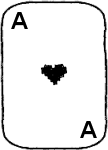  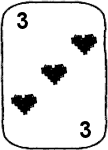 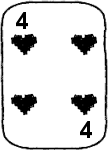 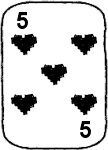 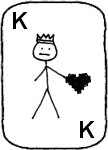
|
 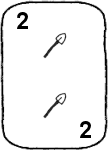 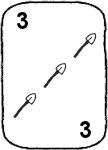 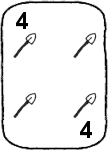 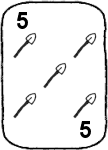 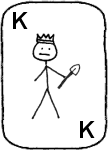
|
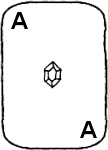 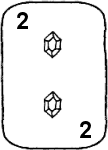 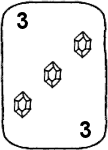 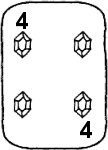 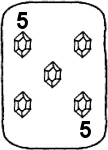 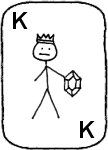
|
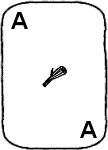 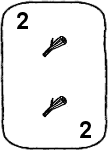 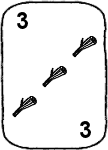 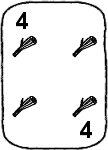 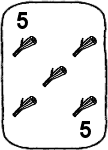 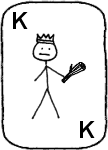
|
Could we please add the card back somewhere on the page too. --Urutsini 00:17, 16 December 2009 (UTC)
Game Rules
I'm noticing some odd behavior with single cards, like a single '3' counting at 9 points. Anyone else seeing something similar? --Itsatrap 19:41, 15 December 2009 (UTC)
- At second glance, it may be a problem with aces not rendering properly in some circumstances--I drew a 5 and the count didn't change. --Itsatrap 19:42, 15 December 2009 (UTC)
- More specifically, it looks like ad.gif isn't displaying quite right, not even here in the wiki. Hmmm. --Itsatrap 19:54, 15 December 2009 (UTC)
- Works just fine for me. You must have an ad filter active, and it thinks that ad.gif corresponds to an ad. I wonder why... --Flargen 19:55, 15 December 2009 (UTC)
- Checking it now... up, my ad blocker doesn't seems to like it. Ah, the joys of namespace collisions! --Itsatrap 19:56, 15 December 2009 (UTC)
- Works just fine for me. You must have an ad filter active, and it thinks that ad.gif corresponds to an ad. I wonder why... --Flargen 19:55, 15 December 2009 (UTC)
- More specifically, it looks like ad.gif isn't displaying quite right, not even here in the wiki. Hmmm. --Itsatrap 19:54, 15 December 2009 (UTC)
Just an FYI, if anyone has any problems seeing some pics with "ad" somewhere in its name or directory, add the following exclusions to you ad blocking software. There are absolutely no ads from either site in these directories. --JRSiebz (☎|§|‡) 01:55, 16 December 2009 (UTC)
@@http://kol.coldfront.net/thekolwiki/images/*@@http://images.kingdomofloathing.com/*
Game table
Anybody care to make a table similar to this for 11? I could try and start but others would probably be more able to do it properly. Morgoth1145 20:01, 15 December 2009 (UTC)
- Figuring the optimum strategy is going to be tougher than you think, because of the generous odds skully gives us. See [2]. Also I still want someone to confirm that the dealer stays on a soft 9 as well as a hard 9, and I have played a ton of games and not seen a soft 9 from the dealer yet to check it. Also the getting to 5 cards and winning rule needs to be accounted for. On the other hand, at least we don't have splits! --Umbrageofsnow 21:15, 15 December 2009 (UTC)
- Actually it won't be tougher than I think, because if I thought that it was going to be easy then I'd have done it myself. In fact, it could be a little easier than I think because I might go and do extra work when some more advanced combinatorics could simplify the work for each square.
- Anyway, I've been using a scheme similar to this and been getting about 5 Crimbux per adventure on average. It's not rigorously calculated (due to the fact that such work would be rather detailed), but it's served me well enough. Morgoth1145 21:24, 15 December 2009 (UTC)
| Your hand | Dealer's face-up card | |||||||||
|---|---|---|---|---|---|---|---|---|---|---|
| 2 | 3 | 4 | 5 | A | ||||||
| Hard totals (Any Ace must be 1) | ||||||||||
| 10 | S | S | S | S | S | |||||
| 9 | S | S | S | S | H | |||||
| 8 | S | S | H | H | H | |||||
| 7 | H | H | H | H | H | |||||
| 6 | D | D | D | D | D | |||||
| 3-5 | H | H | H | H | H | |||||
| Soft totals (Hand contains an Ace that can be either 1 or 6) | ||||||||||
| 2 | 3 | 4 | 5 | A | ||||||
| A,4 | S | S | S | S | S | |||||
| A,A A,2 A,3 | H | H | H | H | H | |||||
Key:
- S = Stand
- H = Hit
- D = Double (if not allowed, then hit)
Sweet, thanks for that Morgoth. I have been in two minds about hitting 9 v A so I'm glad someone else thinks hitting is wise. Although, I also suspect it is better odds to stand on 7 v 3 and potentially double on 5 v 3 (and maybe even 2) as the chances of a bust by the dealer are high. A+4 v A might need looking at too. However I have not done the stats either so all this is still speculation. Also, the strategy currently on the main page is incorrect, could it be removed until someone works out the stats. --Urutsini 22:33, 15 December 2009 (UTC)
I'm no gambler — would some kind soul please explain the distinction between "hard" and "soft" totals for me? --Kay Dekker 00:43, 16 December 2009 (UTC)
"Soft" is when an A is in your hand that could be counted as 1 or 6. "Hard" is when it can only be counted as 1. --Urutsini 00:49, 16 December 2009 (UTC)
- Ah, I see — thank you! --Kay Dekker 01:30, 16 December 2009 (UTC)
- It's not quite so simple, because with only one deck you have to take into account exactly what cards on the table. Here is a table of the optimal choices for all possibilities. It's currently in html, but if someone wants to format this properly for the wiki, that would be useful. --Smote 08:27, 16 December 2009 (UTC)
- Oo, thanks. I didn't expect somebody to go and go that detailed (though I was hoping for it.) I was only using my table as a guideline, since individual cards weighed the options so heavily. If nobody else has made the table for the wiki by the time I get home this afternoon, I may take a shot at that. Morgoth1145 16:35, 16 December 2009 (UTC)
- Okay, I started it (and am still working on it.) The table is on The Crimbo 11 Table/Optimal Table, because it's going to be big and ugly. I'll finish it, but in case I fall off the face of the earth, there's a pretty good starting point for finishing it. Morgoth1145 20:28, 16 December 2009 (UTC)
- And it is done. I'm leaving the page I temporarily saved it on, if people want to delete it that's fine. I'm placing this on the article now. Morgoth1145 20:52, 16 December 2009 (UTC)
- Awesome, that should be helpful.--Smote 21:51, 16 December 2009 (UTC)
- I took the hard 11s out of the table (but left the soft 11s), since the game shouldn't even let you hit on those, although there is a known bug where it sometimes does. Not having these useless entries should make it slightly easier to read.--Smote 22:19, 16 December 2009 (UTC)
- Oo, nice. I wasn't eagerly anticipating doing that myself. Morgoth1145 00:07, 17 December 2009 (UTC)
- I wrote my own program to compute probabilities and validate with simulation and can confirm that the table posted by Smote is accurate. Expected payout is about 4.134 Crimbux (validating a number someone else posted as well).--Kpsmith67 23:53, 16 December 2009 (UTC)
Hit on 11
I am using Google Chrome on Windows Vista, and there seems to be an odd occurrence when hitting that your total reaches 11, yet it still gives you the option to hit or stand. I have gotten it several times, but only one time previously have I tried hitting on 11, which gave me a King and a total of 16. There doesn't seem to be anything special associated with this, and is probably just an error. --Snufstyle420 20:54, 15 December 2009 (UTC)
- That's happened to me every time I get 11 with a 4th card. With 3 cards, it doesn't happen, so it's just a programming bug. Morgoth1145 21:09, 15 December 2009 (UTC)
- This is not a bug. If you have 11 but one of them is an Ace being counted as a 6, you might still want to hit, because the dealer can get 11 to push, whereas if you hit enough to have 5 cards without busting, you win automatically. Quick example, Ace,2,3 counts as 11, but the dealer can get an 11 to push. If you keep hitting and end up with, say, Ace,2,3,Ace,3, that counts as 10, but triggers the 5-card-no-bust automatic win.--AnyLameName 21:27, 15 December 2009 (UTC)
- I just got an Ace, Two, and Three, and was not offered to hit or stand. Morgoth1145 21:44, 15 December 2009 (UTC)
- And an Ace, Three, King, and Two and was offered to hit or stand. (Note that that's a hard 11) Morgoth1145 21:51, 15 December 2009 (UTC)
- There's a forum post somewhere by CDM that says the offer to hit on a four-card hard 11 is a known bug.--Invariel 23:45, 15 December 2009 (UTC)
Coding
I've just written a python program to calculate the expected payout for this game. Here are the assumptions I used:
- The computer stands on a soft 9
- If both the player and computer have an 11!, it counts as a tie
- If the player gets 5 cards without busting, the computer gets a chance to do the same, resulting in a tie
- The player always picks the option with the highest expected payout
Then the expected result of 11 is a gain of roughly 37.4% of your initial bet. Assuming all this is accurate, this means that betting 11 Crimbux every game will result in an average net gain of 4.113 Crimbux per turn.--Yiab 04:02, 16 December 2009 (UTC)
I wrote the program too.
the only different is that I didn't use Rule 3: "* If the player gets 5 cards without busting, the computer gets a chance to do the same, resulting in a tie"
I got 37.58% gain.--peter50216 12:24, 16 December 2009 (UTC)
- Your assumptions aren't correct. If the player gets 11!, they automatically win, the dealer doesn't check. If the player gets 5 cards without busting, they automatically win without any check. Also, I have seen the dealer get 6 cards. It is possible for the dealer to get over 5 cards, so take that into consideration. I should note that I was getting 4.5-5 Crimbux per adventure using intuition with my table above (which is now obsolete.) Morgoth1145 16:35, 16 December 2009 (UTC)
- The only way he would be able to get 6 cards were if he managed to get all 4 aces. I thought the dealer treated all aces as hard aside from the first, and unless there's some error in the logic, he should stop after getting them (6+1+1+1). Are you sure it just wasn't some lag wonkiness?--Toffile 16:49, 16 December 2009 (UTC)
- A couple of questions for those of you who know the implementation better than I do:
- If the dealer has an 11! and the player has an 11 (no bang), is that a tie or a loss?
- Does the dealer win with 5 cards/no bust? If so, does that beat a player 11 (no bang)?--Yiab 17:38, 16 December 2009 (UTC)
- Just re-ran the calculations with the corrections mentioned, and I assumed the worst-case for the player in my above question, resulting in a 36.3% gain. Considering the only changes I made were beneficial to the player, I don't understand why this answer is lower - maybe there's an error in my program somewhere.--Yiab 17:47, 16 December 2009 (UTC)
- The dealer does not win with 5 cards no bust and doesn't treat an 11! for itself differently than a regular 11. I'm not sure what rules you might still have different, but if you get it right I believe the optimal gain is 37.58%, which is pretty close to your result. This corresponds to an average gain of 4.1338 crimbux on a bet of 11, with optimal play.--Smote 18:21, 16 December 2009 (UTC)
- Example of 5 cards under 9: 2, 2, 2, A, A. Also, I think that the gain is higher than 4.1338, because intuitively with my bad table I got 4.5. I doubt that over 300+ turns I'd be that far away from the average gain. (And we'll see about today's gains...) Morgoth1145 18:34, 16 December 2009 (UTC)
- Even with 300 turns spent, the difference between 4.5 and 4.13 is less than the difference of randomly getting two 11!s versus losing two hands. There is a lot of randomness involved. There are some people reporting 5+, but there are also people reporting 3 per turn with optimal play. A good or bad streak throwing off expected results is to be expected. Be sure to take careful notes, since gamblers have a tendency to remember good luck and forget bad.--Smote 20:08, 16 December 2009 (UTC)
- I just took my total Crimbux winnings and divided by the number of turns I spent at 11. Maybe the gain is only 4.1338, it just seems that that large of a sample size should lessen the expected error range. Of course, I haven't actually calculated said range (due to not actually remembering the formula), so... Morgoth1145 21:24, 16 December 2009 (UTC)
- See my statistical analysis section below. Your results are not improbable.--Smote 05:13, 17 December 2009 (UTC)
- I just took my total Crimbux winnings and divided by the number of turns I spent at 11. Maybe the gain is only 4.1338, it just seems that that large of a sample size should lessen the expected error range. Of course, I haven't actually calculated said range (due to not actually remembering the formula), so... Morgoth1145 21:24, 16 December 2009 (UTC)
- Even with 300 turns spent, the difference between 4.5 and 4.13 is less than the difference of randomly getting two 11!s versus losing two hands. There is a lot of randomness involved. There are some people reporting 5+, but there are also people reporting 3 per turn with optimal play. A good or bad streak throwing off expected results is to be expected. Be sure to take careful notes, since gamblers have a tendency to remember good luck and forget bad.--Smote 20:08, 16 December 2009 (UTC)
- Example of 5 cards under 9: 2, 2, 2, A, A. Also, I think that the gain is higher than 4.1338, because intuitively with my bad table I got 4.5. I doubt that over 300+ turns I'd be that far away from the average gain. (And we'll see about today's gains...) Morgoth1145 18:34, 16 December 2009 (UTC)
- The dealer does not win with 5 cards no bust and doesn't treat an 11! for itself differently than a regular 11. I'm not sure what rules you might still have different, but if you get it right I believe the optimal gain is 37.58%, which is pretty close to your result. This corresponds to an average gain of 4.1338 crimbux on a bet of 11, with optimal play.--Smote 18:21, 16 December 2009 (UTC)
- A couple of questions for those of you who know the implementation better than I do:
- The only way he would be able to get 6 cards were if he managed to get all 4 aces. I thought the dealer treated all aces as hard aside from the first, and unless there's some error in the logic, he should stop after getting them (6+1+1+1). Are you sure it just wasn't some lag wonkiness?--Toffile 16:49, 16 December 2009 (UTC)
Okay, updated with the answers to my remaining questions and got an expected net gain of about 36.927%. Here is the bet multiplier I used:
- If the player has an 11!, gain is 4
- If the player hasn't busted and has at least 5 cards, gain is 1
- If the player has busted, gain is -1
- If the dealer has busted, gain is 1
- If the player has a higher score than the dealer, gain is 1
- If the player and dealer have the same score, gain is 0
- If the player has a lower score than the dealer, gain is -1
- Double the gain if the bet has been doubled.--Yiab 20:47, 16 December 2009 (UTC)
- Is your program properly tracking the probability of each card being dealt based on what is already on the table (and keeping in mind that there are 8 cards worth 5)? It's still not quite matching the results that have been independently verified. My C program is calculating the probability directly rather than doing repeated simulations to estimate the probability. Are you calculating it or simulating it?--Smote 21:06, 16 December 2009 (UTC)
- My program is calculating the probabilities, not simulating the game. The odds are being calculated taking into account cards that have already been dealt, and that there are 8 cards worth 5. I do not make any distinction between cards of the same value, only keeping track of the ones in play and the number still in the deck. Come to think of it, the odds may be thrown off very slightly by a simplification I made - In order to avoid representing the dealer's hidden card, I start the dealer with a 1-card hand, and the computer's decision tree guarantees that it will always hit first (since the value of a single card is always less than 9). Would this throw the odds calculation off? By the way, the precise value I calculated is 28,516,951/77,224,455 for gain.--Yiab 21:16, 16 December 2009 (UTC)
- I draw the dealer's hidden card last too. That shouldn't make a difference in the odds. I'm not sure where the slight difference is coming from. If you plot a table of choices in each situation, is it different at all from the agreed upon optimal choices?--Smote 21:48, 16 December 2009 (UTC)
- Surprisingly, it is slightly different. I've only tested a couple of specific choices so far, but my expected payoffs if the player has a 2 and a 4 and the dealer has a 4 are:
- Stay: -67.8%
- Hit: 33.8%
- Double: 67.6%
- Which would recommend doubling, though the table on the page here recommends hitting. What are the expected values for that situation in your program?--Yiab 23:33, 16 December 2009 (UTC)
- We are using "player 11 ties with dealer 11!", right? 'cause that's how it operates. (Since this isn't mentioned on the page anywhere.) Morgoth1145 00:13, 17 December 2009 (UTC)
- Yes, I am using that fact (I asked a question about that above and it was answered). I think the discrepancy may be that I was accidentally preventing the player from hitting with a 4-card soft 11, whereas if you are ever in that situation it is always better to hit (A 4-card soft 11 means hitting can't make you bust, so you get 5 cards and win, denying the dealer the chance to tie with you).--Yiab 01:14, 17 December 2009 (UTC)
- The double down number should be lower. The fact that it's exactly double the hit percentage is a red flag. With double down you get one and only one more card, you don't keep playing as normal with double the wager. So the expected return is generally less than double that of hit due to the fact that you don't get the chance to hit again if you need to.--Smote 01:21, 17 December 2009 (UTC)
- I'm quite aware that doubling down gives you exactly one more card, that's not overlooked in my program. The fact that doubling down is exactly double the hit payoff says only that the best payoff after hitting is always to stay, something which could easily be offset by accidentally omitting the possibility of hitting on a 4-card soft 11. Unfortunately, adding this into my program still leaves me with an overall gain of 36.926%. Do you speak (poorly-documented) python or feel like sharing your C?--Yiab 01:33, 17 December 2009 (UTC)
- My exact payoffs in that case you asked about are stay=-67.7694%, hit=26.4010%, double=25.8558%. As you can see, the stay is exactly the same as yours, but the others are much different (at least compared to before you fixed that bug). My C source is available at [3]. Note that it was thrown together hastily for personal use, so it's not pretty, and the tabs and/or line feeds probably need to be reformatted depending on what editor you use. I'm not proficient in python, but I could probably follow along.--Smote 03:01, 17 December 2009 (UTC)
- I rewrote my program from the ground up, and it now agrees with your calculations. I'm guessing that the problem was some sort of weird python-specific thing. Thanks for all your help!--Yiab 03:24, 18 December 2009 (UTC)
- My exact payoffs in that case you asked about are stay=-67.7694%, hit=26.4010%, double=25.8558%. As you can see, the stay is exactly the same as yours, but the others are much different (at least compared to before you fixed that bug). My C source is available at [3]. Note that it was thrown together hastily for personal use, so it's not pretty, and the tabs and/or line feeds probably need to be reformatted depending on what editor you use. I'm not proficient in python, but I could probably follow along.--Smote 03:01, 17 December 2009 (UTC)
- I'm quite aware that doubling down gives you exactly one more card, that's not overlooked in my program. The fact that doubling down is exactly double the hit payoff says only that the best payoff after hitting is always to stay, something which could easily be offset by accidentally omitting the possibility of hitting on a 4-card soft 11. Unfortunately, adding this into my program still leaves me with an overall gain of 36.926%. Do you speak (poorly-documented) python or feel like sharing your C?--Yiab 01:33, 17 December 2009 (UTC)
- We are using "player 11 ties with dealer 11!", right? 'cause that's how it operates. (Since this isn't mentioned on the page anywhere.) Morgoth1145 00:13, 17 December 2009 (UTC)
- Surprisingly, it is slightly different. I've only tested a couple of specific choices so far, but my expected payoffs if the player has a 2 and a 4 and the dealer has a 4 are:
- I draw the dealer's hidden card last too. That shouldn't make a difference in the odds. I'm not sure where the slight difference is coming from. If you plot a table of choices in each situation, is it different at all from the agreed upon optimal choices?--Smote 21:48, 16 December 2009 (UTC)
- My program is calculating the probabilities, not simulating the game. The odds are being calculated taking into account cards that have already been dealt, and that there are 8 cards worth 5. I do not make any distinction between cards of the same value, only keeping track of the ones in play and the number still in the deck. Come to think of it, the odds may be thrown off very slightly by a simplification I made - In order to avoid representing the dealer's hidden card, I start the dealer with a 1-card hand, and the computer's decision tree guarantees that it will always hit first (since the value of a single card is always less than 9). Would this throw the odds calculation off? By the way, the precise value I calculated is 28,516,951/77,224,455 for gain.--Yiab 21:16, 16 December 2009 (UTC)
- Is your program properly tracking the probability of each card being dealt based on what is already on the table (and keeping in mind that there are 8 cards worth 5)? It's still not quite matching the results that have been independently verified. My C program is calculating the probability directly rather than doing repeated simulations to estimate the probability. Are you calculating it or simulating it?--Smote 21:06, 16 December 2009 (UTC)
Script
A mafia ASH script which implements the optimal solution is located here: [4]. This is based on the calculated table located here: [5]. This table is known and agreed to be the optimal solution by several different players who are far better at mathematics and statistics than I am. Good luck at the tables, and merry crimbo. The optimum is 4.13 Crimbux/adventure with a bet size of 11 crimbux. I do not think that this script belongs linked on the main page, but it's quite nice for a talk page. --MindlessGames 20:54, 16 December 2009 (UTC)
I think it's a typing error. In the script, you should hit on 24 vs 4 and double on 33 vs 4 and the script handle these two cases wrong. --peter50216 04:57, 18 December 2009 (UTC)
Statistical Analysis
I performed a statistical analysis of the distribution of scores. See the forum for more details. The odds of each outcome in a given turn of optimal play are the following: regular win (+1x) 27.701%, regular loss (-1x) 38.757%, push (0) 17.376%, double win (+2x) 2.851%, double loss (-2x) 1.721%, 11! (+4x) 11.594%.
After 100 turns of wagering 11 and playing optimally, the odds of getting X crimbux per turn or less (followed by the odds of getting more than that amount) are:
-3.3, 0.0002% 99.9998%,
-2.2, 0.0061% 99.9939%,
-1.1, 0.0930% 99.9070%,
0.0, 0.7998% 99.2002%,
1.1, 4.1881% 95.8119%,
2.2, 14.2425% 85.7575%,
3.3, 33.4615% 66.5385%,
4.4, 57.9121% 42.0879%,
5.5, 79.1840% 20.8160%,
6.6, 92.1295% 7.8705%,
7.7, 97.7465% 2.2535%,
8.8, 99.5124% 0.4876%,
9.9, 99.9201% 0.0799%,
11.0, 99.9901% 0.0099%,
12.1, 99.9991% 0.0009%,
13.2, 99.9999% 0.0001%. --Smote 05:12, 17 December 2009 (UTC)
- Huh, that's a much wider probable range than I expected. I guess I shouldn't trust my intuition as to how wide bell curves are. Morgoth1145 14:19, 17 December 2009 (UTC)
Some parts of the optimal playing are quite weird,For example,i don't think it would be a good idea to hit while having a 4 and a 5 card.This is due to the fact,that,unlike real blackjack,KoL makes the first player who busted automatically lose,instead of first seeing who has busted more,and then making that player lose.This shoudl be had in mind.--Spartadude 12:04, 17 December 2009 (UTC)
- where did you play blackjack? i want to play there. everywhere else you bust, you lose. you don't unlose because someone else loses more than you, you just lose. --Evilkolbot 12:53, 17 December 2009 (UTC)
- The math is complicated (I posted my source code earlier if you want to inspect it), but the results have been independently confirmed by multiple implementations by multiple people. To put it in simple terms, if the dealer has a 5 and you have a 4 and a 5, out of 6 possible cards there are 3 cards the dealer could draw that would make him beat you, 1 card that would make them tie you, and 2 cards that would make him have an 8 or less and draw again for a decent chance of beating or pushing you. In other words, the odds aren't good for you if you stand in that situation. If you hit, only 2 out of the 6 cards will make you not bust, so your odds aren't good that way either, but your odds are slightly less bad. You're pretty screwed either way in that situation. For some hands, there is no great choice, so you have to go with the least bad choice.--Smote 21:49, 17 December 2009 (UTC)
Hotkeys
Play using your keyboard:
H = Hit
S = Stand
D = Double Down
P = Play Again
I suspect this works on any browser that supports C.A.B. hotkeys.
--Weregoose 09:20, 21 December 2009 (UTC)
Changed odds?
When Edwing Abbidriel changes the payouts for the slot machines, does it also change the odds for this game? Playing by the optimal rules, I was increasing my crimbux by very nearly 3 per adv last week. Now, over a run of 50 adv, I had only two adv with a total crimbux above my starting point, at the end I'm down 88. I'm wondering if the dealer is cheating now or it's just bad luck. --Club (#66669) (Talk) 20:55, 21 December 2009 (UTC)
50 adventures isn't nearly enough to determine a trend, it's probably just bad luck. I haven't noticed any change, and I don't think there is really any reason to expect one. --Cubsmaniac 21:04, 21 December 2009 (UTC)
- 50 is short, but this is the first case of a 50adv run ending up negative in my 700 or so turns of history with this game, hence my concern. --Club (#66669) (Talk) 22:02, 21 December 2009 (UTC)
- Your concern is not justified. It happens. Over 50 turns, the odds aren't even that low of it happening. In my analysis above, you can see that it's possible to end up negative even after 100 turns, but after only 50 turns it's far more probable than after 100. Even if it were improbable, which it's not, there are enough people playing the game that it would be happening to some of them every day. The odds have not changed. Every day several people post on the forum that the odds have improved because they had a good streak, or they've gotten worse because they've had a bad streak. They are always wrong, they just don't have a solid grasp of probability.--Smote 23:06, 21 December 2009 (UTC)

